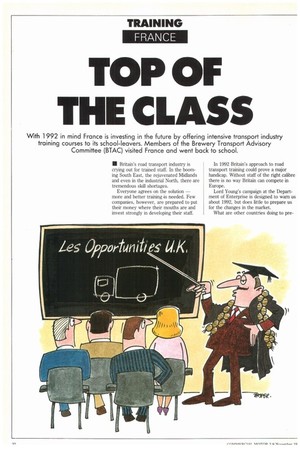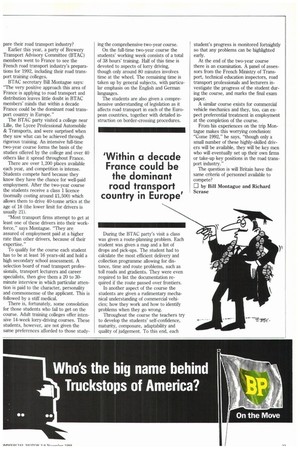TOP OF THE CLASS
Page 30

Page 31

If you've noticed an error in this article please click here to report it so we can fix it.
With 1992 in mind France is investing in the future by offering intensive transport industry training courses to its school-leavers. Members of the Brewery Transport Advisory Committee (BTAC) visited France and went back to school.
• Britain's road transport industry is crying out for trained staff. In the booming South East, the rejuvenated Midlands and even in the industrial North, there are tremendous skill shortages.
Everyone agrees on the solution more and better training is needed. Few companies, however, are prepared to put their money where their mouths are and invest strongly in developing their staff. In 1992 Britain's approach to road transport training could prove a major handicap. Without staff of the right calibre there is no way Britain can compete in Europe.
Lord Young's campaign at the Department of Enterprise is designed to warn us about 1992, but does little to prepare us for the changes in the market.
What are other countries doing to pre pare their road transport industry?
Earlier this year, a party of Brewery Transport Advisory Committee (BTAC) members went to France to see the French road transport industry's preparations for 1992, including their road transport training colleges.
BTAC secretary Bill Montague says: "The very positive approach this area of France is applying to road transport and distribution leaves little doubt in BTAC members' minds that within a decade France could be the dominant road transport country in Europe."
The BTAC party visited a college near Lille, the Lycee Professional Automobile & Transports, and were surprised when they saw what can be achieved through rigorous training. An intensive full-time two-year course forms the basis of the studies offered by the college and over 40 others like it spread throughout France.
There are over 1,200 places available each year, and competition is intense. Students compete hard because they know they have the chance for well-paid employment. After the two-year course the students receive a class 1 licence (normally costing around 21,500) which allows them to drive 40-tonne artics at the age of 18 (the lower limit for drivers is usually 21).
"Most transport firms attempt to get at least one of these drivers into their workforce," says Montague. "They are assured of employment paid at a higher rate than other drivers, because of their expertise."
To qualify for the course each student has to be at least 16 years-old and hold a high secondary school assessment. A selection board of road transport professionals, transport lecturers and career specialists, then give them a 20 to 30minute interview in which particular attention is paid to the character, personality and commonsense of the applicant. This is followed by a stiff medical.
There is, fortunately, some consolation for those students who fail to get on the course. Adult training colleges offer intensive 14-week lorry-driving courses. These students, however, are not given the same preferences afforded to those study ing the comprehensive two-year course.
On the full-time two-year course the students' working week consists of a total of 38 hours' training. Half of this time is devoted to aspects of lorry driving, though only around 80 minutes involves time at the wheel. The remaining time is taken up by general subjects, with particular emphasis on the English and German languages.
The students are also given a comprehensive understanding of legislation as it affects road transport in each of the European countries, together with detailed instruction on border-crossing procedures.
During the BTAC party's visit a class was given a route-planning problem. Each student was given a map and a list of drops and pick-ups. The student had to calculate the most efficient delivery and collection programme allowing for distance, time and route problems, such as toll roads and gradients. They were even required to list the documentation required if the route passed over frontiers.
In another aspect of the course the students are given a rudimentary mechanical understanding of commercial vehicles; how they work and how to identify problems when they go wrong.
Throughout the course the teachers try to develop the students' self-confidence, maturity, composure, adaptability and quality of judgement. To this end, each student's progress is monitored fortnightly so that any problems can be highlighted early.
At the end of the two-year course there is an examination. A panel of assessors from the French Ministry of Transport, technical education inspectors, road transport professionals and lecturers investigate the progress of the student during the course, and marks the final exam paper.
A similar course exists for commercial vehicle mechanics and they, too, can expect preferential treatment in employment at the completion of the course.
From his experiences on the trip Montague makes this worrying conclusion: "Come 1992," he says, "though only a small number of these highly-skilled drivers will be available, they will be key men who will eventually set up their own firms or take-up key positions in the road transport industry."
The question is will Britain have the same criteria of personnel available to compete?
12 by Bill Montague and Richard Scrase
























































